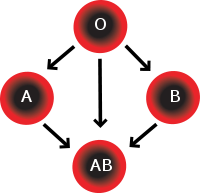 In my practice I have found that patients who know and follow their basic ABO blood type diet as described in Eat Right 4 Your Type works very well. However, some individuals may not derive maximum benefit from the Blood Type Diet until they first determine their Secretor Status. Knowing this information then allows for the use of the more specific diet lists included in the book Live Right 4 Your Type. Both books were written by Peter J. D'Adamo.
In my practice I have found that patients who know and follow their basic ABO blood type diet as described in Eat Right 4 Your Type works very well. However, some individuals may not derive maximum benefit from the Blood Type Diet until they first determine their Secretor Status. Knowing this information then allows for the use of the more specific diet lists included in the book Live Right 4 Your Type. Both books were written by Peter J. D'Adamo.
In the genetics of the secretor system two options exist. A person can be either a secretor (Se) or a non-secretor (se). This is completely independent of whether you are a blood type A, B, AB, or O. Thus a person could be an A secretor or an A non-secretor, a B secretor or a B non-secretor, etc.
Secretors: In a simplified sense, a secretor is defined as a person who secretes their blood type antigens into body fluids and secretions like the saliva in your mouth, the mucus in your digestive tract and respiratory cavities, etc.
Non-Secretors: A non-secretor on the other hand puts little to none of their blood type into these same fluids.
As a general rule, in the US about 15-20% of the population are non-secretors with the remaining 80-85% being secretors. In my family of five, four of us are seceretors and only one is a non-secretor. Aside from the physical implications centering around whether you have blood type antigens in your body fluids or not, the secretor genetics have additional significance through the effects of gene linkage: In other words, the outcome of your secretor genetics 'links' to other seemingly unrelated genes and influences their function.
In addition, as a generality, being a Non-secretor (based on all of the available information) does actually appear to be a potential health disadvantage. At a very basic level, being able to secrete blood type into your saliva, mucus, etc. allows for an added degree of protection against the environment, particularly with respect to microorganisms and lectins.
Several years ago I developed the desire to learn the science behind the blood type diet as a way of life. The reason was my wife's chronic pains that I could not help with my chiropractic set of tools. I felt like my schooling had failed me in enabling me to help my most treasured relationship. In hind sight I now know that Sandy was meant to be in my life to help me learn many lessons. Most husbands need to admit this about their spouse. Sandy is an amazing woman and I would be lost in many ways without her. I am truly indebted to her.
My learning journey took me to the Institute for Human Individuality where I studied (and continue to do so today) the concepts behind the Blood Type Diet.
Your ABO blood type is controlled by your genetics, just as are your hair or eye color and many of your other attributes. The gene coding for your blood type lies on chromosome 9q34. However, other separate genes on chromosome 11 and 19 actually interact with your blood type gene, determining your ability to secrete your ABO blood type antigens into your body fluids and secretions. This is called the secretor gene, and by testing for this gene we can determine whether you are a secretor or non-secretor. A simple saliva test kit is available for about the fee for an office visit.
I focus a lot of my clinical efforts in helping people recover from chronic conditions such as diabetes, autoimmune thyroid, peripheral neuropathy, fibromyalgia, balance disorders, tinnitus, autism, ADD/ADHD, digestive and skin issues, etc. Knowing the connection between blood type and secretor status and susceptibility to these conditions is important.
Here are a few examples:
Autoimmune Disease
Non-secretors appear to have an increase in the prevalence of a variety of autoimmune diseases including ankylosing spondylitis, reactive arthritis, psoriatic arthropathy, Sjogren's syndrome, multiple sclerosis, and Grave's disease.
Diabetes, Heart Disease, & Metabolic Syndrome X
Non-secretors are at a greater risk of developing diabetes (especially adult onset diabetes); and they might be at a greater risk of developing complications from diabetes. Data allows the conclusion that Non-secretors are a risk factor for myocardial infarction and heart disease (note: this is particularly true for men).
Several different researchers have noted a connection between a metabolic syndrome called "Syndrome X" and Non-secretor blood types. Syndrome X is a clustering of metabolic problems comprised of insulin resistance (your cells do not respond effectively to the insulin that you create), elevated plasma glucose (high blood sugar), lipid regulation problems (elevated triglycerides, increased small low-density lipoproteins, and decreased high-density lipoproteins), high blood pressure, a prothrombic state (tendency to clotting), and obesity (especially central obesity or a predisposition to gaining weight in the abdomen).
This cluster of metabolic disorders seem to interact to promote the development of diabetes (adult onset type II), atherosclerosis, and cardiovascular disease. And while insulin resistance might lie at the heart of the problem, all of these metabolic disorders appear to contribute to health problems.
If you would like to find out your blood type and secretor status and how we might use this information along with other types of treatment, call my office at 586-731-8840.





